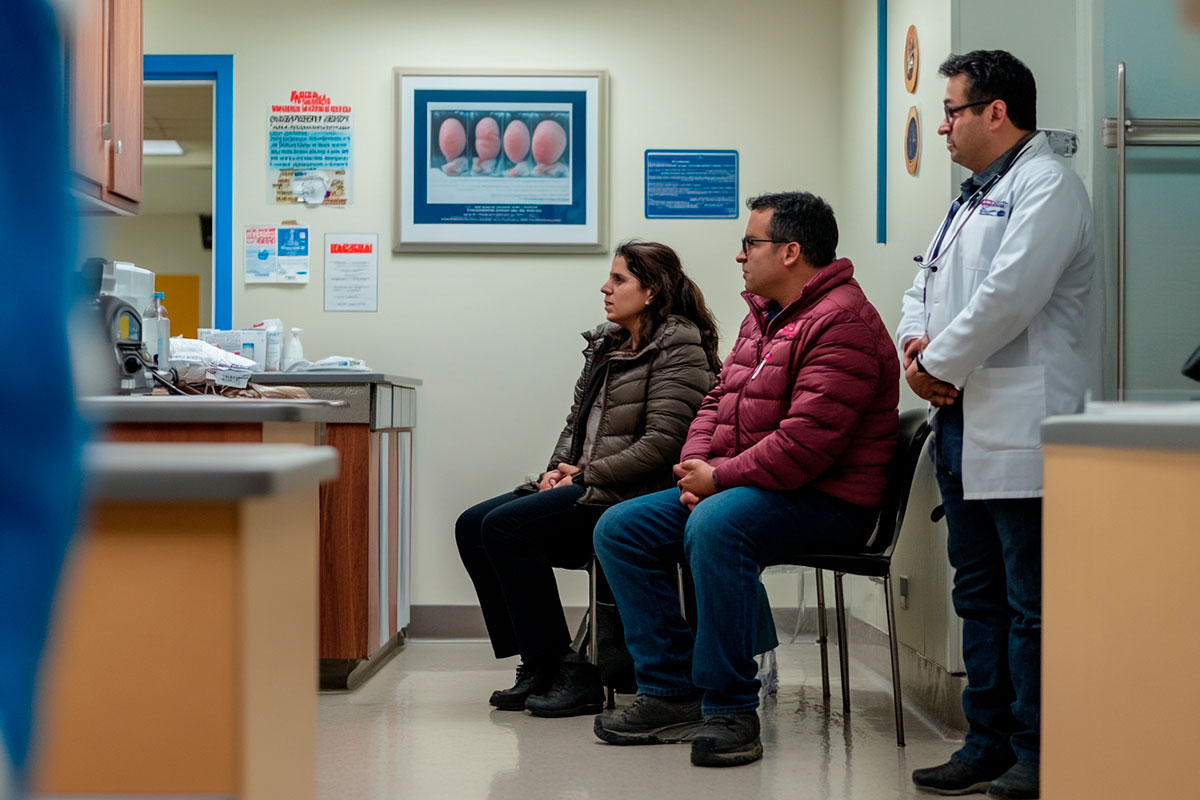Clinic Consultation offers the artificial insemination procedure in Repentigny / QC, providing a safe and effective option for individuals seeking to enhance their chances of conception. This less invasive method is ideal for couples with mild fertility challenges, as well as single women and same-sex couples using donor sperm.
At Clinic Consultation, advanced technology is used to monitor the patient’s ovulatory cycle, ensuring the ideal timing for insemination. With expert care throughout the process, patients receive personalized support tailored to their unique fertility needs.
In Repentigny / QC, Clinic Consultation is committed to helping you achieve your fertility goals. Schedule a consultation today to begin your journey.
Artificial insemination is a straightforward procedure that involves inserting sperm directly into a woman’s uterus. The process begins with ovarian stimulation through medications to induce ovulation. The sperm, either from a partner or a donor, is prepared in a lab to concentrate healthy sperm cells. Once ovulation occurs, the sperm is introduced into the uterus via a catheter.
The procedure is painless, and the woman can resume her normal activities shortly afterward. Monitoring ovulation through ultrasounds is essential to ensure the timing is right for insemination.
In What Cases Is It Indicated?
Artificial insemination is recommended for couples facing mild infertility issues, such as low sperm motility, irregular ovulation, or cervical mucus problems that hinder the movement of sperm toward the egg. It is also suitable for same-sex couples or single women who want to conceive using donor sperm.
Additionally, artificial insemination can be helpful in cases of unexplained infertility or when certain conditions make natural conception difficult, as long as the fallopian tubes are healthy and unobstructed.
Pre-Insemination Care and Preparations
Before undergoing artificial insemination, both partners (or the sperm donor) undergo fertility tests to assess their reproductive health. The woman undergoes hormone tests and ultrasounds to monitor her ovulation and ensure that her uterus and ovaries are functioning well.
Additionally, doctors often advise maintaining a healthy lifestyle, including balanced nutrition, regular exercise, and stress reduction. Avoiding smoking and excessive alcohol consumption is also recommended to increase the chances of success during the treatment.
Conditions to Undergo the Procedure
To be eligible for artificial insemination, women must have regular ovulation or be able to ovulate with the help of medications. Their fallopian tubes must be clear, as fertilization happens naturally within the body. The quality of the sperm, whether from a partner or a donor, must also meet certain standards for a higher likelihood of success.
In cases of more severe fertility problems, such as blocked fallopian tubes or poor sperm quality, artificial insemination may not be suitable, and in vitro fertilization (IVF) could be a better option.
The Influence of Age on Artificial Insemination
Age is a key factor in the success of artificial insemination. Women under 35 years old have higher chances of success due to better egg quality. After 35, fertility declines, which can impact the success rates of the procedure.
Women over 40 may still pursue artificial insemination, but doctors usually evaluate ovarian reserves and recommend more advanced fertility treatments if necessary. Discussing age-related fertility concerns with a doctor is crucial for choosing the right path.
Difference Between Artificial Insemination and In Vitro Fertilization (IVF)
Artificial insemination is less invasive and simpler compared to IVF. In insemination, sperm is placed directly into the uterus, allowing fertilization to occur naturally. IVF, on the other hand, involves extracting eggs from the woman’s ovaries, fertilizing them with sperm in a laboratory, and then transferring the embryo to the uterus.
IVF is generally recommended for more severe cases of infertility, such as blocked fallopian tubes or significant sperm issues, while artificial insemination is for milder cases and less invasive.
How Many Days After Insemination Can I Take a Pregnancy Test?
It is advisable to wait between 12 and 14 days after artificial insemination before taking a pregnancy test. Testing too early could result in a false negative, as the embryo may not have implanted yet, or hormone levels may still be too low to detect pregnancy.
A Blood test may also be recommended by your doctor to confirm pregnancy more accurately, as it measures the hormone hCG earlier than home pregnancy tests.
What Are the Success Rates of Artificial Insemination?
Success rates for artificial insemination vary depending on factors like age and the cause of infertility. Women under 35 years old typically have a success rate of around 10% to 20% per cycle. However, these rates decrease significantly after the age of 40.
It’s common for women to require multiple cycles to achieve pregnancy. Persistence, along with regular medical monitoring, increases the chances of success, although some may need to explore alternative options like IVF.
Frequently Asked Questions
1. How many cycles of artificial insemination can I try?
Generally, doctors recommend trying 3 to 4 cycles before considering alternatives like IVF.
2. Is artificial insemination painful?
No, the procedure is usually painless, though some women may experience mild discomfort similar to menstrual cramps.
3. Does artificial insemination increase the chances of multiple pregnancies?
Yes, particularly if ovulation-stimulating medications are used, as they can cause the release of multiple eggs.
4. Can I resume normal activities after the procedure?
Yes, most women can return to their usual routine the same day after a short rest.
5. What happens if the first cycle doesn’t work?
If the first attempt fails, your doctor may adjust the treatment for subsequent cycles to increase the chances of success.
